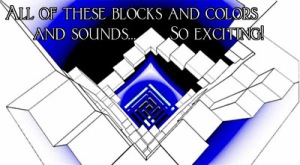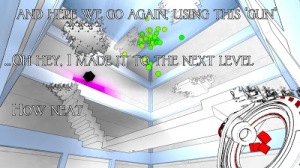Sometimes I feel like my brain isn’t as active when I am playing a video game. I could be grinding for the hundredth time in Persona 3, or shooting at a lot of things and watching them turn to red pieces of guts and blood (or sunshine and bunnies if I turned on the gore filter). There are games that allow for zoning out, but then there are games like Portal that challenge me to think and problem solve. Puzzle games have often been overshadowed by much more “fun” games. It’s hard to show people how going from one room to the next solving puzzles is just as fun as shooting at your friends or going treasure hunting in the jungle. Antichamber is a game where you discover the “fun” of playing a puzzle game is finding out how to get to the next room.
From the beginning, Antichamber is set up as a simple game, with settings and controls laid out on a wall in front of you. Everything about the art style screams simplicity: almost everything is in either black or white, or uses basic, bright colors as a way to set the tone, and there isn’t any music playing in the background. Sound effects pepper the levels, from a rainstorm pounding away overhead, to the sounds of a summer night, with crickets chirping and grass swaying in the wind. Each level gives off a certain vibe, and those feelings can change based on how you interact with the level. One of the puzzles involves falling down a very large shaft, and before you fall you can hear the rain and thunder as you interact with the level. Once you jump down, the thunder and rain get louder, the volume increases and the rain intensifies until it peaks, with a giant crack of lighting and the sound of thunder roaring as you hit the floor. I was astounded at how simply moving around in this labyrinth of rooms can enthrall me as much as Antichamber did. It is so amazing to play a simplistic puzzle game that can put me on the edge of my seat while trying to just move from one room to the next. What makes this game even more astounding is that it can do all of this without a narrative.
Every game has to have a narrative of some kind. Many games focus on the narrative, as it is the main vessel for conveying themes and emotions to the player. Antichamber takes all of that and says “Who needs a narrative?” Aside from small pictures and abstract sentences that really only give the vaguest of clues, there isn’t a narrative in Antichamber. There is a nice flow of the pictures that you find as they show off a kind of slideshow as you find more of them, but for the most part, the game does away with any kind of story or plot and instead just puts you in front of a puzzle and says “Here you go, problem solve.” I think it is the best idea in the entire game. Without having to worry about the framework of a narrative, or trying to find a way to fit the puzzles to a certain theme within a story, Antichamber is refined into its best possible form. And it conveys that overall sense of simplicity so well I was constantly thinking and re-thinking about Antichamber even after I finished the game. It gave me a slight lab-rat vibe as there wasn’t any context to why I was solving the puzzles, but after the first few chambers, I realized that I didn’t care about the context because the puzzles themselves were so much fun. Antichamber takes simple controls and complex puzzles and makes a masterpiece of a puzzle game, while challenging you to re-think much of what you assume about games overall.
From the first chamber, I was thrown off about how I thought this game might progress. In it, I spawned on one side of a very large chasm with what looked like a next room on the other side. Floating above in large block letters was the word jump. So I obviously jumped, assuming that something would happen to allow me to cross what looked like an impassable distance. I fell down and surprisingly didn’t die. I was led to the next level at the bottom of the chasm with a small picture and a simple statement “Failing to succeed does not mean failing to progress.” I was stunned and excited, realizing that this was not going to be as simple or as straightforward as I first assumed. Antichamber constantly tricks you into changing the rules in your head that have been built up by years of similar concepts that span hundreds of games. It is a fantastic experience trying to expect anything and still not realizing how to progress, until something clicks in your mind and you realize how simple it is after the fact. Antichamber is very unique in that the simple concepts introduced in the beginning are the same concepts that are used throughout the entire game, and all of the difficulty, variety, and fun come from changes or modifications on those simple concepts.
The first chunk of chambers involves simply moving through various puzzles discovering some of the basic concepts of the game. Then, once you receive your “gun”, things evolve and grow more complex. While the contraption acquired is best described as a gun, it’s mostly just something that you use to pick up and place the colored blocks that start appearing in later levels. Once you start interacting with the blocks, you unlock further levels and discover different rooms and how they are all connected. Some rooms are stand-alone, where you are given a set number of blocks, or are limited in where you can go, and other rooms are connected together, where bringing materials with you grants access to rooms otherwise locked or inaccessible. As the game progresses new functions are added by acquiring a new “gun” sporting a new color, and different mechanics are introduced. Things like false walls and floors or backtracking to find a different room than before are all smaller parts of a bigger experience. And despite each of these aspects that add layers of difficulty, and sometimes confusion, the same basic principles and ideas that made you question everything in the beginning of the game are never changed or grow too complex.
Puzzle games aren’t something people actively look for when browsing for a new game to play. I’m sure everyone has heard of Portal or plays a few puzzle games on their phone, but it’s not like there is a new Puzzle game released by Activision every year like Call of Duty. I’m quite thankful of this fact, for it is Antichamber’s uniqueness that adds to the long list of reasons why anyone and everyone should pick this game up. If you have a PC and can run Steam on it, buy this game. It is that good. I recommend this game wholeheartedly and without reservation, because it has been one of the most fun, challenging, maddening, and interesting games I have played in recent times.
Comments




















